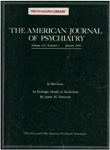Tardive dyskinesia and anticholinergic drugs
Abstract
The evidence from the literature does not support the notion that psychotropic drugs with central anticholinergic properties (antiparkinsonian drugs, neuroleptics, antidepressants) constitute a risk factor in tardive dyskinesia. Antiparkinsonian drugs tend to produce reversible increases in the severity of dyskinetic movements and can be used as pharmacological probes in the assessment of neuroleptic-induced movement disorders.
Access content
To read the fulltext, please use one of the options below to sign in or purchase access.- Personal login
- Institutional Login
- Sign in via OpenAthens
- Register for access
-
Please login/register if you wish to pair your device and check access availability.
Not a subscriber?
PsychiatryOnline subscription options offer access to the DSM-5 library, books, journals, CME, and patient resources. This all-in-one virtual library provides psychiatrists and mental health professionals with key resources for diagnosis, treatment, research, and professional development.
Need more help? PsychiatryOnline Customer Service may be reached by emailing [email protected] or by calling 800-368-5777 (in the U.S.) or 703-907-7322 (outside the U.S.).



